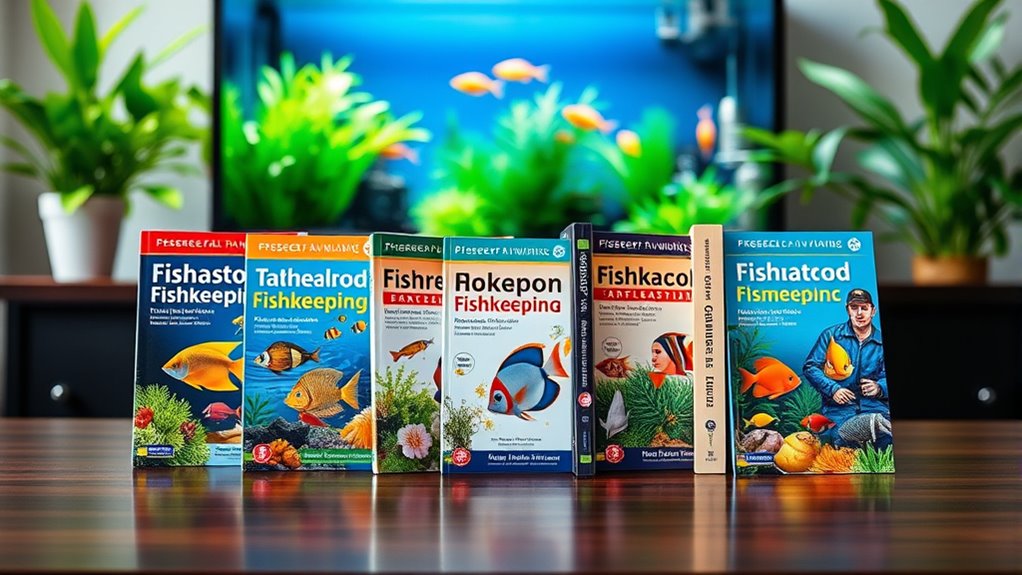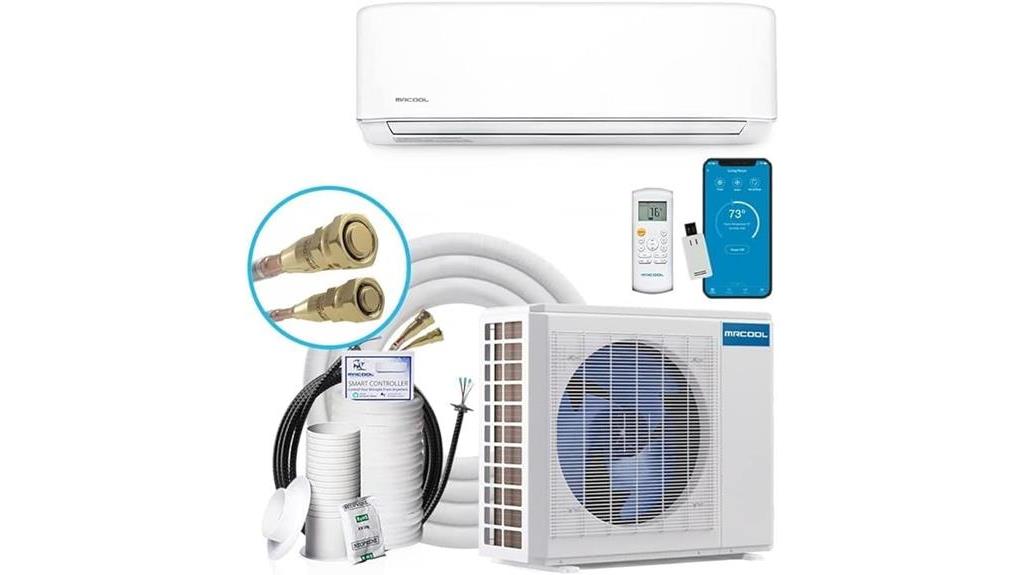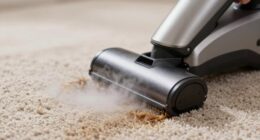If you’re looking to deepen your fishkeeping knowledge, I recommend exploring five top educational books that suit different ages and skill levels. These books cover everything from beginner tips to scientific facts, with engaging visuals and practical guidance. They are credible, accurate, and packed with interactive features to make learning fun. Keep exploring, and you’ll discover how these resources can help you become a more confident and knowledgeable aquarium enthusiast.
Key Takeaways
- Choose age-appropriate books with simple explanations and engaging visuals for beginners and young aquarium enthusiasts.
- Prioritize books featuring vibrant illustrations, diagrams, and visual aids to enhance understanding and interest.
- Select resources offering clear, step-by-step practical guidance on aquarium setup, maintenance, and troubleshooting.
- Ensure the books are scientifically accurate, authored or reviewed by experts, and include credible references.
- Opt for interactive and hobby-level books with quizzes, activities, and real-world tips to deepen knowledge and hands-on skills.
Aquarium Logbook for Kids
Are you looking for a fun and educational way to introduce kids to the world of fishkeeping? The Aquarium Logbook for Kids is perfect for young marine enthusiasts. Sized 8.5×11 inches, it offers 120 pages filled with activities that make learning exciting. Kids can record fish species, behaviors, and feeding habits, helping them observe and understand aquatic life. It encourages responsibility by tracking aquarium conditions and animal health. This logbook isn’t just about recording; it sparks curiosity and develops observational skills. Get it today and inspire your child’s love for the ocean’s wonders while fostering hands-on learning.
Best For: young children and beginners who are interested in learning about marine life and fishkeeping through a fun, educational activity book.
Pros:
- Encourages hands-on learning and curiosity about aquatic ecosystems
- Provides structured sections for tracking fish species, behaviors, and aquarium conditions
- Promotes responsibility and observational skills in young learners
Cons:
- May require adult supervision for some activities or observations
- Limited to basic information; not suitable for advanced marine biology enthusiasts
- The size and number of pages might be less appealing to older children seeking more in-depth content
Fishkeeping 101: Beginner’s Guide to Aquarium Care
If you’re just starting out with fishkeeping, “Fishkeeping 101: Beginner’s Guide to Aquarium Care” is an excellent resource to build a solid foundation. It covers essential steps like selecting the right tank size, choosing suitable equipment, and decorating with natural elements to create a healthy environment. The guide explains how to pick compatible fish based on tank conditions and maintain proper water chemistry by monitoring pH, ammonia, nitrite, and nitrate levels. It also offers practical advice on feeding routines, recognizing health issues early, and maintaining your aquarium regularly. With clear instructions, it’s perfect for beginners enthusiastic to succeed and enjoy the hobby.
Best For: Beginners interested in establishing a healthy, well-balanced aquarium environment and learning the fundamentals of fishkeeping.
Pros:
- Provides comprehensive guidance on tank setup, fish selection, and water chemistry maintenance.
- Includes easy-to-follow instructions and illustrations suitable for beginners.
- Covers essential health management tips to promote fish longevity and vitality.
Cons:
- May require additional resources for advanced aquarium setups or rare species.
- Some details might be too basic for experienced hobbyists seeking in-depth technical information.
- Does not include specific product recommendations for equipment or supplies.
Aquatic Habitats: Aquariums Inspired by Nature
For anyone enthusiastic to create vibrant, natural-looking aquariums, “Educational Books on Fishkeeping” offers invaluable guidance on replicating aquatic habitats inspired by nature. Understanding freshwater ecosystems is vital since over half of all fish species live in these environments, yet many hobbyists overlook their origins. Tai Strietman’s “Aquatic Habitats” takes you on journeys to diverse freshwater regions worldwide, providing insights into setting up authentic habitats at home. The book emphasizes recreating natural conditions using proper equipment and aquascaping techniques, helping you craft stunning tanks that not only look beautiful but also support healthy, thriving aquatic life.
Best For: hobbyists of all experience levels who want to create authentic, naturalistic freshwater aquariums inspired by diverse aquatic habitats worldwide.
Pros:
- Provides detailed insights into natural freshwater ecosystems and species origins.
- Offers step-by-step guidance on replicating habitats with appropriate equipment and aquascaping techniques.
- Enhances understanding of environmental parameters, promoting healthy aquatic environments.
Cons:
- May require additional research or specific equipment for highly accurate habitat recreation.
- Some techniques and materials might be costly or specialized for beginners.
- Focus primarily on freshwater habitats, which may limit applicability for saltwater aquarium enthusiasts.
100 Scientific Myths: Popular Beliefs and Misinterpretations
Understanding scientific myths is vital for anyone interested in fishkeeping, especially when misconceptions can lead to harmful practices. Many popular beliefs about fish and aquariums are actually myths that persist despite evidence to the contrary. These misconceptions can cause unnecessary stress or harm to aquatic life. By questioning these beliefs and seeking factual information, you can improve your fishkeeping skills and ensure healthier, happier fish. This section aims to reveal common misunderstandings, clarify scientific truths, and help you develop an informed approach to maintaining your aquarium. Recognizing myths is an essential step toward responsible and successful fishkeeping.
Best For: beginner and experienced fishkeepers seeking to dispel common misconceptions and improve their aquarium practices.
Pros:
- Promotes accurate understanding of fishkeeping science to prevent harmful practices.
- Enhances fish health and well-being by encouraging evidence-based methods.
- Fosters responsible and informed decisions for long-term aquarium success.
Cons:
- May challenge long-held beliefs, requiring an open mind to change habits.
- Some myths are deeply ingrained, making them difficult to fully dispel.
- The abundance of information might be overwhelming for newcomers seeking quick solutions.
Another Logic Workbook for Gritty Kids
Another Logic Workbook for Gritty Kids stands out as an ideal choice for parents and educators seeking engaging, developmentally appropriate activities that build critical thinking and perseverance. This follow-up to a best-seller offers over 200 puzzles and challenges designed for children aged 8-12. It features a variety of puzzle types, from math and logic problems to word games and spatial reasoning, all organized to foster persistence and confidence. With colorful illustrations, encouraging rhymes, and puzzles that grow progressively harder, it keeps kids motivated while developing STEM skills. Perfect for homeschoolers, car rides, or quiet time, it’s a durable, fun resource that promotes thoughtful problem-solving.
Best For: parents, educators, and caregivers seeking a comprehensive, engaging workbook to develop critical thinking, problem-solving, and perseverance in children aged 8-12.
Pros:
- Offers over 200 diverse puzzles that grow in difficulty to keep children challenged and motivated
- Features colorful illustrations, encouraging rhymes, and playful characters that foster a positive learning environment
- Promotes grit, confidence, and STEM skills through purposeful activities suitable for various settings like homeschooling, travel, or quiet time
Cons:
- Some puzzles may be too easy for advanced or gifted children, potentially reducing engagement for highly skilled learners
- The physical thickness of the workbook might make it less portable for on-the-go use
- The focus on early success could lead to less challenge for children seeking very high difficulty levels
Factors to Consider When Choosing Educational Books on Fishkeeping

When selecting educational books on fishkeeping, I always consider whether they’re suitable for the reader’s age and skill level. I look for books with clear visuals and practical tips that make learning engaging and easy to follow. Additionally, I check for scientific accuracy and interactive features that deepen understanding and keep interest high.
Age Appropriateness
How do you choose an educational fishkeeping book that’s just right for a child’s age? First, consider whether the language and concepts match their developmental stage. Younger kids benefit from simple explanations and basic care tips, while older children can handle more advanced topics. Check if the book has age-appropriate illustrations and explanations that make complex ideas easy to understand. It’s also important to pick a book that aligns with your child’s reading level to boost confidence and prevent frustration. Additionally, look for age-specific sections or activities that suit their current knowledge. Engaging visuals and interactive elements tailored to their age can make learning more fun and memorable. Overall, selecting a book that fits their age ensures they stay interested and learn effectively.
Visual Engagement
Have you ever noticed how vibrant illustrations and clear diagrams can make learning about fishkeeping much more engaging? I find that bright, colorful visuals grab attention and simplify complex ideas, making them easier to grasp for learners of all ages. Well-designed images, like step-by-step guides or labeled diagrams, support hands-on learning and help with retention. Visual elements such as charts, comparison tables, and visual quizzes keep the material interesting and encourage active participation. Engaging visuals also boost confidence in beginners by offering realistic previews of aquarium environments and fish behavior. When choosing an educational book, look for those with high-quality visuals that clearly highlight key features. Good visual engagement transforms learning from a chore into an enjoyable exploration of the aquatic world.
Practical Guidance
Choosing the right educational book on fishkeeping hinges on practical guidance that you can easily apply. I look for books that provide clear, step-by-step instructions on setting up and maintaining an aquarium, ensuring I can follow along without confusion. Visual aids like diagrams and illustrations are essential—they help me understand complex procedures and equipment use quickly. I also prioritize resources that emphasize safety and hygiene, teaching proper handling of fish and water chemistry management. Troubleshooting tips and common problem-solving strategies are invaluable, helping me address challenges as they arise. Additionally, I prefer books that include checklists, log sheets, or tracking templates, making it easier to monitor water parameters and overall tank health. Practical guidance keeps my fishkeeping journey manageable and enjoyable.
Scientific Accuracy
When selecting an educational book on fishkeeping, verifying its scientific accuracy is key to gaining reliable knowledge. I always check if the book is written or reviewed by experts in ichthyology or aquaristics, ensuring the information is credible. Reputable sources and references to scientific studies or recognized authorities strengthen the book’s reliability. I also look for content that accurately describes fish anatomy, behavior, habitat, and environmental needs based on current scientific understanding. It’s important to be cautious of books that use sensational language or make unsubstantiated claims, as these can mislead. Ideally, the book presents up-to-date information reflecting recent advances and consensus in fish science. Scientific accuracy forms the foundation for safe and successful fishkeeping, so I prioritize it above all.
Interactive Elements
Ever wondered how interactive elements can boost your learning experience in fishkeeping? Including quizzes, puzzles, or activities in a book makes learning more engaging and helps reinforce key concepts. Hands-on components like DIY tank setup guides or troubleshooting exercises allow you to apply what you’ve learned practically. Features that encourage note-taking or charting fish behavior can sharpen your observational skills and foster a sense of responsibility. Digital or augmented reality elements provide immersive experiences, bringing aquatic environments to life right on your device. Reflection prompts and problem-solving challenges encourage critical thinking and deepen your understanding of fish care practices. When choosing an educational book, look for these interactive features—they make learning more dynamic, enjoyable, and effective.
Hobby Level
Selecting the right educational book depends heavily on your current hobby level, so it’s important to find one that matches your experience and knowledge. If you’re a beginner, look for books that clearly explain basic concepts like water chemistry, tank setup, and species compatibility. These will help you build a solid foundation without feeling overwhelmed. For intermediate hobbyists, seek resources that explore into topics like breeding, habitat recreation, and maintenance routines, helping you refine your skills. Advanced enthusiasts should focus on books covering specialized equipment, complex ecosystems, and innovative breeding techniques. Make sure the book offers practical, step-by-step guidance and illustrations suited to your skill level. Aligning the content with your current goals ensures you get the most value and continue progressing confidently in your fishkeeping journey.
Frequently Asked Questions
Which Books Are Most Suitable for Advanced Fishkeepers?
When considering books for advanced fishkeepers, I look for titles that explore into complex topics like breeding, disease management, and water chemistry. I recommend “Ecology of the Planted Aquarium” by Diana Walstad, which offers in-depth insights, and “The Marine Aquarium Handbook” by Martin A. Moe for saltwater enthusiasts. These books challenge and expand my understanding, helping me refine my skills and guarantee a thriving, healthy aquarium.
How Can I Assess the Credibility of Fishkeeping Educational Books?
Back in the day, I’d say evaluating a fishkeeping book’s credibility starts with checking the author’s background—are they experienced or published by reputable sources? I also look for recent editions, which indicate updated info, and peer reviews or testimonials from seasoned aquarists. If the book cites scientific studies and covers practical, evidence-based advice, I trust it more. This helps me confirm I’m learning from a reliable guide.
Are There Specific Books Focusing on Freshwater Versus Saltwater Aquariums?
You’re asking if there are books tailored specifically for freshwater versus saltwater aquariums. I’ve found that many guides focus on one or the other, like “The Simple Guide to Freshwater Aquariums” or “Saltwater Aquariums for Dummies.” I recommend choosing books that match your setup because freshwater and saltwater fishkeeping have unique needs. This way, you get accurate, relevant advice to keep your tanks thriving.
What Age Groups Are These Educational Books Appropriate For?
When considering age appropriateness, I find that beginner books are perfect for young learners and newcomers, offering simple, straightforward facts. Intermediate guides suit curious teens eager to expand their expertise. Advanced books are ideal for seasoned hobbyists, providing detailed, in-depth explorations. I recommend matching the material to the reader’s age and experience, ensuring every enthusiast, regardless of age, can enjoy and excel in their aquatic adventures.
Do These Books Include Troubleshooting Common Fish Health Issues?
You’re wondering if these books cover troubleshooting common fish health issues. I can tell you they do! Many of these books offer detailed advice on diagnosing and treating problems like ich, fin rot, and water quality issues. They include practical tips and step-by-step guides, making it easier for you to keep your fish healthy. I found them incredibly helpful whenever I faced tricky health challenges in my own aquarium.
Conclusion
If you’re serious about diving into fishkeeping, these books are your best bet to steer clear of rocky waters. They cover everything from basics to fascinating facts, helping you build a solid foundation. Think of them as your trusty map on this underwater adventure—guiding you smoothly through the depths. With the right knowledge, you’ll avoid sailing into stormy seas and enjoy a thriving, vibrant aquarium that truly stands out.















